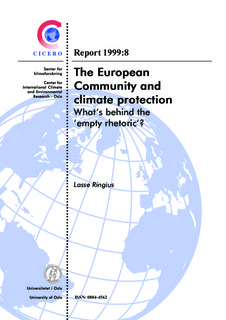| dc.contributor.author | Ringius, Lasse | nb_NO |
| dc.date.accessioned | 2014-03-17T14:29:58Z | |
| dc.date.available | 2014-03-17T14:29:58Z | |
| dc.date.issued | 1999 | nb_NO |
| dc.identifier.issn | 0804-4562 | nb_NO |
| dc.identifier.uri | http://hdl.handle.net/11250/192058 | |
| dc.description.abstract | The EC has been hoping to play an environmental leadership role in the global climate negotiations and has been proposing comparatively stringent climate targets for the OECD countries. But especially the United States and to some extent the international environmental community have criticized the EC for being unable to develop effective climate policies that will achieve its ambitious targets.
This publication shows that the EC in general expects that it is relatively inexpensive to implement climate policy within the EC and that its climate policy strategy from the beginning has been heavily influenced by the notion of environmental leadership. The defensive positions taken by the United States and Japan in the global climate negotiations have made EC environmental leadership seem simultaneously economically, environmentally and politically beneficial, and political and environmental interests have pushed EC climate policy to go further than what it otherwise would have been. | nb_NO |
| dc.language.iso | eng | nb_NO |
| dc.publisher | CICERO Center for International Climate and Environmental Research - Oslo | nb_NO |
| dc.relation.ispartof | CICERO Report | nb_NO |
| dc.relation.ispartofseries | CICERO Report;1999:08 | nb_NO |
| dc.title | The European Community and climate protection: What's behind the 'empty rhetoric'? | nb_NO |
| dc.type | Research report | nb_NO |
| dc.source.pagenumber | | nb_NO |
